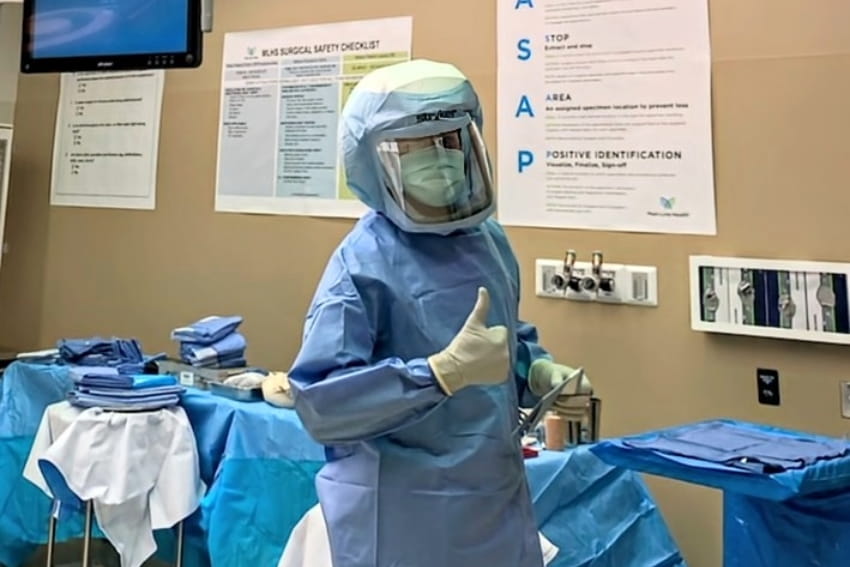A day in the life of an orthopaedic nurse

When you’re in five to six surgeries a day — or almost 20 surgeries a week — the operating room becomes like another home. To Isaiah Washington, orthopaedic surgical nurse at Main Line Health’s Riddle Hospital, surgery is second nature and routine.
Of course, his patients aren’t as familiar with the operating room as he is, and it can understandably lead to some anxiety. "To you, it may be your first surgery, first knee replacement, even your first time in the hospital," he says. "When you’re at Main Line Health with the orthopaedics team, we understand that. It’s never going to be second nature to you — but it will always be second nature to us."
Working mostly on knee replacements, hip replacements and spinal surgeries, most of Isaiah’s procedures are elective.
"Whether it’s a stiff hip that’s causing you constant pain or an arthritic knee that’s limiting your ability to function, we’re here to help. Our job is to do what we can to provide you with a better quality of life and help you get back to doing the things that you love," he explains. If you happen to have a fall and fracture a bone in your hip, ankle or another part of your body, the surgical team at Riddle Hospital is more than capable of taking care of those needs as well."

While all of Isaiah’s days don’t look the same, there’s a consistency to them — one designed to provide predictability and the best possible care for his patients. Here’s a snapshot of a day in the life of Isaiah, an orthopaedic surgical nurse.
6:30 a.m.: Clock-in
"The first thing I do is I clock in, change into my operating room (OR) scrubs and see what my assignments are," Isaiah says.
While he could look at his assignments in advance, Isaiah prefers to assess each day at its start. "When I come in, that's when I focus on what I have to do because, as an OR nurse, plans can change in an instant," he explains.
While he might work with any orthopaedic surgeon at Riddle Hospital, Isaiah primarily works with the same surgeons, which helps create a rapport that benefits the patient.
"I understand their needs. I understand how they function as a surgeon the same way they understand how I function as a surgical nurse," he says. "That's pretty much how it is with all of our surgeons. They expect the best out of us because we expect the best out of them, and, together, the patient expects the most out of all of us."
Early morning: Prep for surgery
Isaiah’s typical role in the operating room is scrub nurse, whose job it is to directly assist the surgeon. His primary responsibility in that role is to ensure the surgical team has everything they need beforehand, including instruments.
"My goal is to set up the OR tables, make sure I have all my equipment and ensure everything is sterile, safe and sound. I have it all assembled, everything's working perfectly and there's no issues on my end," he says. "Once I'm comfortable with that, the surgery will start."
This responsibility is crucial to the patient’s safety. Inadequate sterilization can lead to infections and poor outcomes. Other problems with instrumentation, like holes, can lead to surgical complications and delays.
Isaiah’s goal is to spot issues before they could ever pose a risk to the patient. "That way, everybody is focused on what they have to do because they already trust me to know what I have to do," he says.
Mid-day: Surgery time
Pre-surgical interviews
Before surgery, Isaiah meets with his patients. Because his shift spans the entire day, he’s usually with his patients from start to finish. Pre-surgical interviews allow him to establish a connection with his patients, answer any last-minute questions and make sure they feel cared for.
"I always tell them — just think of me as your eyes and ears doing surgery. I understand the environment that you’re in and I understand how to be your best advocate when you need it most," he says.
Their job, he tells them, is to start focusing on recovery. "Everything else — we're going to take care of ," he’ll tell them.
Surgery
As an orthopaedic surgical nurse, most of Isaiah’s procedures are elective cases, meaning they aren’t done in response to an injury or emergency. Instead, he’ll assist in procedures like total knee replacements and hip replacements.
During surgery, Isaiah’s job is to pass instruments back and forth. "I need to anticipate the surgeon’s needs but also make sure that everything on the back end is working correctly," he explains. "That way, once the surgeon has an instrument in his hands, he doesn't have to worry about it not functioning. His main focus can be on doing what he has to do for the patient."
This process is repeated five, sometimes six times a day depending on the surgical needs of our unit. While each procedure has its own set of requirements according to the patient’s needs, the consistency of the process helps everyone know their responsibilities to keep patients safe.
6:30 p.m. Transition care
Before heading home for the day, most of Isaiah’s patients are recovering from their surgeries. That’s one of the reasons he chose the 6:30 a.m. to 6:30 p.m. shift — he’s with his patients all day, and he can see them through the entire process.
If a surgery does run longer than expected, it’s common for Isaiah to stay longer to finish what he started. "If I've been in your surgery for the first hour, and I can continue that, that continuity of care is important," he says.
At the end of his shift, Isaiah is responsible for providing the next nurse on duty with a report on how the surgery went. "I tell them everything that went right about the surgery, any unexpected complications, what the patient is to expect afterward and any type of additional treatment that they should know about," he says.
When he heads out for the day, Isaiah knows he’s helped his patients achieve a better quality of life. As he says, "After surgery, you can know that you're on the best steps of recovery. You can go back to having that quality of life that you were expecting."
Evening wind-down — and a work-life balance
Isaiah’s job is demanding, and he prioritizes relaxing after a shift. "Sometimes I go for a drive. I like to listen to my music," he says. "I have certain songs that I like to play based on the day."
One of the benefits of Isaiah’s shift is that it helps him maintain a work-life balance. With three 12-hour shifts, he’s able to enjoy his life outside of work. On his off days, you might find him playing basketball, hanging out with friends or spending time with his girlfriend.
This balance, he says, is crucial to performing well at the hospital. "When I am at work, I'm as present as possible," he says. It’s this presence that ensures his patients feel comfortable, stay safe and are prepared to take steps toward healing.
Next steps:
Learn more about orthopaedics at Main Line Health
Providing a clear answer to the question: Is it an infection?
 Content you want, delivered to your inbox
Content you want, delivered to your inbox
Want to get the latest health and wellness articles delivered right to your inbox?
Subscribe to the Well Ahead Newsletter.
